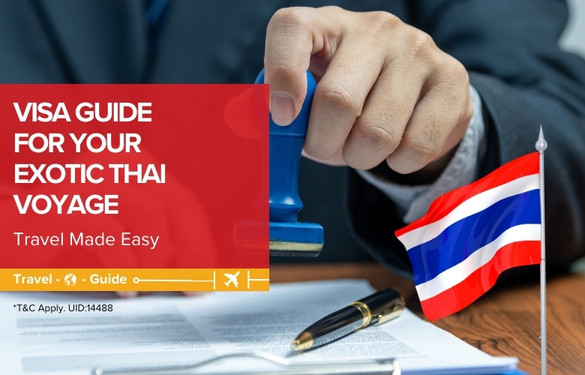

Visa in Thailand
- Introduction
- What is Thailand Visa
- Features
- Types
- Non-Immigrant Visa
- Immigrant Visa
- Visa Application Process
- Validity
- When To Apply
- Documents
- Visa Fees
- Visa Status
- Visa Processing Time
- Conclusion
Travellers are drawn to Thailand, a country in Southeast Asia famed for its bustling cities, majestic temples, and breathtaking scenery. Most visitors to Thailand require a visa. The nation provides a variety of visas, including transit, business, and tourist visas. For up to 15 days if arriving by land or up to 30 days if arriving by air, tourists can normally enter without a visa. Longer visits may necessitate requesting a tourist visa in advance. Before departing, it is advised to confirm the rules with the Thai embassy or consulate.
What is Thailand Visa
Did you know?
- Have you heard that Thailand is renowned for its "Visa Runs"? Some tourists used to do "border runs" by going across a nearby border to extend their visa-free stay in Thailand. The practice of visa runs, however, has been considerably curtailed as a result of tighter immigration regulations in Thailand over time.
Foreign nationals need a Thailand visa in order to enter and remain in the country for a predetermined amount of time. The nation offers a variety of visa kinds for travel, business, and transit. For a limited time, visitors from a few nations can enter without a visa. However, it is important to apply for a visa in advance for longer visits or specific purposes. For the most recent information on visa requirements and regulations, it is advisable to contact the Thai embassy or consulate.
Features of Thailand Visa
Travel tip: Be mindful of your visa's features, such as the length of time you are permitted to remain and extensions, as you explore Thailand. Keep up with the rules while making the most of your visit by being informed.
Depending on the reason for travel, different aspects of a Thailand visa are available. Generally speaking, tourist visas permit stays of 60 days, which may be extended for an additional 30 days. Longer stays are permitted for business-related activities with business visas. Travellers with multiple-entry visas can enter and leave Thailand many times throughout a predetermined time frame. Some nationalities can obtain a visa upon arrival, enabling brief tourist stays. Visas for retirement and education are available for foreigners looking to retire or study in Thailand. Applications, pictures, financial documentation, and supporting documents are just a few examples of requirements.
Types of Thailand Visa
Did you know?
- Did you know that Thailand has a programme called "Thai Elite Visa"? It's a high-end visa option with a variety of packages that allow for long-term residency alternatives for those who are ready to invest as well as extended stays and concierge services.
- Did you know that Thailand provides highly trained workers with a "SMART Visa"? Longer stays and simpler procedures for job or investment opportunities are offered in an effort to entice talent in specific industries.
The many visas available for Thailand are listed below in bullet points:
- Tourist visa: For travel for pleasure, allowing a stay of up to 60 days that may be extended for an additional 30 days.
- Business visa: Offers longer stays than tourist visas and is intended for business-related activities.
- Multiple-Entry Visa: Used frequently by frequent travellers, this type of visa allows repeated entries and exits within a given time frame.
- Visa-on-Arrival: Available to a select group of nationalities, this option permits brief stays (15 to 30 days) for tourism.
- Education Visa: Requires proof of enrollment for students attending Thai educational institutions.
- Retirement Visa: Intended for retirees, this visa requires evidence of financial stability and meets age requirements.
- Non-Immigrant Visa: Can be used for a variety of reasons, such as employment, family, or volunteerism.
- Transit Visa: Permits visitors transiting through Thailand on their way to another country to stay for brief periods of time.
- Diplomatic and Official Visa: This category is only for diplomats, government officials, and ambassadors.
Tip: You may discover Thailand's attractions, travel in and out of the nation, and make the most of your trip plans with a multiple-entry visa. It's similar to holding a passport to the unknown!
Tip: Consider Thailand's transit visa as a "peek-a-boo" chance. Even though you might not have enough time for thorough exploration, you can still sample some Thai food and culture during your layover. Just enough to entice you to return for more!
Non-Immigrant Visa
Did you know?
- "Medical Treatment Visa" is available in Thailand, did you know that? This non-immigrant visa is intended for people travelling to Thailand for medical care. Thailand is a popular destination for medical tourism due to its cutting-edge healthcare facilities and alluring healing surroundings because it allows you to stay for an extended amount of time while obtaining medical care.
The non-immigrant visa for Thailand is intended for people travelling there for particular reasons like employment, family reunion, volunteer activity, or attending conferences. It includes a variety of categories, such as dependent family members (O), business (B), and education (ED). There are prerequisites for each category, such as job proposals for work visas or enrollment documentation for educational visas. Non-Immigrant visas can be extended while in Thailand and often allow for longer stays than tourist visas.
Immigrant Visa
Did you know?
- Did you know that Thailand provides an "Investor Visa"? This immigrant visa is given to people who make sizable investments in particular Thai firms or industries. It's a special route for people who want to support Thailand's economy, obtain permanent residency, and take advantage of the variety of things the nation has to offer.
Those who want to live in Thailand permanently should apply for an immigrant visa. It can be obtained for a number of reasons, including an investment in Thailand, retirement, marriage to a Thai national, or family reunion. Each category has its own needs and processes, such as verification of sponsorship, medical exams, and financial proof.
Visa Application Process
Did you know?
- Did you know that for a slightly extra cost, several Thai embassies provide expedited processing? If you're pressed for time and require your visa sooner, this can be a fantastic choice. For information, merely visit the embassy's website!
The steps involved in obtaining a visa for Thailand are listed below in bullet points:
1. Determine the type: Determine the type of visa you need based on your intended use for the trip (tourist, business, employment, family, etc.).
- Non-Immigrant: Based on your intended use (business, education, dependent family, etc.), select the appropriate non-immigrant visa category.
- Immigrant: Choose the right category for your immigrant visa, such as retirement, marriage, or investment.
2. Collect the following papers: Gather the necessary paperwork, including your passport, the visa application form, two passport-sized pictures, your flight schedule, your lodging information, financial documentation, an invitation letter (if necessary), and any additional paperwork needed for the type of visa you have chosen.
- Non-Immigrant: Gather the necessary papers, including your passport, the visa application form, two passport-sized pictures, an invitation letter (if necessary), your travel schedule, your financial documentation, and any other papers necessary for your particular visa category.
- Immigrant: Assemble the relevant paperwork, including your passport, the visa application form, passport-sized photos, the proof of your relationship (for a marriage visa), the proof of your finances (for a retirement or investment visa), and any other paperwork needed for the visa category you have chosen.
3. Fulfil Application Form: Accurately fill out the visa application form by including all necessary details.
4. Submit Application: Deliver the application to the Thai embassy or consulate in your nation, along with the necessary paperwork.
5. Pay Fees: Pay the application fee for the visa, which varies based on the nationality and kind of visa.
6. Attend an interview, if necessary: An interview may be necessary for some visa types, such as work or study visas. If an interview is set, show up.
7. Wait for Processing: Depending on the type of visa and the number of applications, the processing time for visas can range from a few days to several weeks.
8. Visa collection: Pick up your visa from the Thai embassy or consulate after it has been approved. Verify the visa's expiration dates and any restrictions that may be associated with it.
Tip: Please attend during the designated times for picking up your visa. Before leaving the embassy or consulate, confirm that the information on the visa is accurate, including your name, dates, and passport number.
9. Travel to Thailand: Enter Thailand within the dates indicated on your visa and follow the requirements of the visa.
10. Extension (if applicable): If your visa is extendable, you may request one inside Thailand prior to the expiration of your first visa.
Validity of A Thailand Visa
Did you know?
- Several Thai embassies and consulates offer an "e-Visa on Arrival" service, in case you weren't aware. Before their trip, travellers from eligible countries can apply online for a visa on arrival. Arriving in Thailand can be processed more quickly thanks to this streamlined procedure, which also reduces wait times and annoyance at the airport immigration desks.
Depending on the kind and use, a Thailand visa's duration varies. Typically, tourist visas allow for stays of 60 days, with the option of an extra 30 days. Non-immigrant visas, such as those for work or school, frequently have longer terms and can be renewed inside of Thailand. Visas with multiple entries frequently permit stays of many months.
When To Apply For Thailand Visa
Travel tip: To prevent delays, apply for a Thailand visa when it's not as busy. Quieter times may result in quicker processing and a more pleasant experience.
Applying for a Thailand visa is advised well in advance of the dates you intend to travel there. The timing is determined by the type of visa and the purpose of your trip. Visas for tourists can be requested up to a year in advance of the trip. Once you have the required paperwork and approvals, you should apply for non-immigrant visas like employment or education visas. Like retirement or marriage visas, immigrant visas demand careful planning and should be started several months in advance.
Documents Required
Depending on the type of visa you're seeking, different documents may be needed for a Thailand visa. However, the following is a list of the documents frequently required when applying for a visa:
1. Ensure your passport has a minimum of six months validity after your intended stay.
2. Complete and sign the visa application form available on the Thai embassy's website.
3. Provide passport-sized photos that meet specifications.
4. Show round-trip flight reservations for travel dates. Demonstrate accommodation arrangements with hotel reservations or invitation letters.
5. Prove financial capability with bank statements or income certificates.
6. Include a host's invitation letter with their details if visiting family/friends.
7. Supply employment or enrollment documents for work/study visas.
8. Depending on visa type, submit additional documents like business letters, marriage certificates, or retirement fund proofs.
9. Display intent to return home using property ownership, employment, or family obligations.
10. Some visas might require health insurance proof. Confirm visa fee payment.
Thailand Visa Fees
Did you know?
- Did you know that the price of a Thailand visa might vary depending on your country of citizenship? Check the precise fee that applies to your nationality as the costs may differ for residents of various nations.
Depending on the type of visa you're applying for and your country of citizenship, Thailand visa fees change. For single-entry visas with a 60-day stay, the normal price range for tourist visas is $30 to $60. Visas for non-immigrants, such as those for business or school, typically cost $50 to $200 or more. While immigrant visas may have varying pricing tiers based on criteria like retirement, marriage, or investment, multiple-entry visas may be more expensive.
Check For Visa Status
Tip: A few days prior to the expiration of your anticipated visa processing time, set a reminder on your phone or calendar. This way, you'll remember to check the status of your visa and can take care of any potential problems right away.
You need to go to the official website of the Thai embassy or consulate where you submitted your application in order to find out the status of your application for a visa to Thailand. You can find the "Visa Application Status" or a section similar to it on the website, input your application reference number and other information, and get the most recent status of your application.
Visa Processing Time
Tip: On a Wednesday or Thursday, submit your application for a visa to Thailand. By doing this, you can escape the Monday rush and give your application a head start, which might speed up processing.
Depending on the type of visa you're looking for, your country of citizenship, and the amount of applications currently being processed, Thailand visa processing periods might vary significantly. Visas for tourists typically take two to ten business days. Non-immigrant visa applications could take two to six weeks, particularly if an interview or supplementary paperwork is needed. Processing delays for immigrant visas may be lengthy, frequently lasting several weeks to several months.
Conclusion
In conclusion, getting a Thailand visa requires knowing which kind specifically fits your travel needs. While non-immigrant visas are designed to meet needs for jobs, studies, or family reunions, tourist visas enable shorter stays for recreation. You can help assure a simple and successful visa application procedure for your trip to Thailand by conducting a thorough study and adhering to the instructions supplied by the Thai embassy or consulate.








 Health Insurance
Health Insurance  Travel Insurance
Travel Insurance  Car Insurance
Car Insurance  Cyber Insurance
Cyber Insurance  Critical Illness Insurance
Critical Illness Insurance
 Pet Insurance
Pet Insurance
 Bike/Two Wheeler Insurance
Bike/Two Wheeler Insurance  Home Insurance
Home Insurance  Third Party Vehicle Ins.
Third Party Vehicle Ins.  Tractor Insurance
Tractor Insurance  Goods Carrying Vehicle Ins.
Goods Carrying Vehicle Ins.  Passenger Carrying Vehicle Ins.
Passenger Carrying Vehicle Ins.  Compulsory Personal Accident Insurance
Compulsory Personal Accident Insurance  Travel Insurance
Travel Insurance  Rural
Rural 










